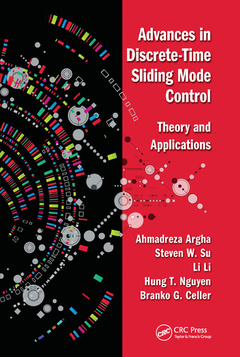Description
Advances in Discrete-Time Sliding Mode Control
Theory and Applications
Authors: Argha Ahmadreza, Su Steven, Li Li, Nguyen Hung Tan, Celler Branko George
Language: English
Subject for Advances in Discrete-Time Sliding Mode Control:
Keywords
Discrete Time Sliding Mode Control; Sliding Mode; exogenous; Uncertain Linear Discrete Time System; disturbances; Disturbance Estimator; schur; Discrete Time Sliding Mode Controller; complement; Sliding Mode Control; systems; Closed Loop System State; disturbance; Exogenous Disturbance; observer; Pid Controller; law; QSM; closed; Discrete Time System; loop; LMI Condition; Steven Su; Sparse Control; Li Li; Static Output Feedback; Hung Tan Nguyen; Sliding Mode Controller; Branko George Celler; Ultimate Bound; Uncertain Discrete Time Systems; LMI Stability Condition; Schur Complement; Full Row Rank; Hr Profile; Data Packet Dropout; Sliding Mode Dynamics; Packet Dropout; WAM Model
57.55 €
In Print (Delivery period: 14 days).
Add to cartPublication date: 06-2020
· 15.6x23.4 cm · Paperback
190.51 €
In Print (Delivery period: 14 days).
Add to cartPublication date: 06-2018
· 15.6x23.4 cm · Hardback
Description
/li>Contents
/li>Readership
/li>Biography
/li>
The focus of this book is on the design of a specific control strategy using digital computers. This control strategy referred to as Sliding Mode Control (SMC), has its roots in (continuous-time) relay control. This book aims to explain recent investigations' output in the field of discrete-time sliding mode control (DSMC).
The book starts by explaining a new robust LMI-based (state-feedback and observer-based output-feedback) DSMC including a new scheme for sparsely distributed control. It includes a novel event-driven control mechanism, called actuator-based event-driven scheme, using a synchronized-rate biofeedback system for heart rate regulation during cycle-ergometer.
Key Features:
- Focuses on LMI-based SMC (sliding mode control) for uncertain discrete-time system using novel nonlinear components in the control law
- Makes reader understand the techniques of designing a discrete controller based on the flexible sliding functions
- Proposes new algorithms for sparsifying control and observer network through multi-objective optimization frameworks
- Discusses a framework for the design of SMC for two-dimensional systems along with analyzing the controllability of two-dimensional systems
- Discusses novel schemes for sparsifying the control network
1 Introduction. 2 LMI-based SF DSMC. 3 LMI-based output feedback DSMC. 4 NCSs with measurement packet losses5 NCSs with actuation and measurement packet losses. 6 Sparse DSMC for NCSs. 7 Optimal sparse SMC for NCSs. 8 DSMC for 2D Systems. 9 Controllability Analysis of 2D systems. 10 HR Regulation During Cycle-Ergometer Exercise.

